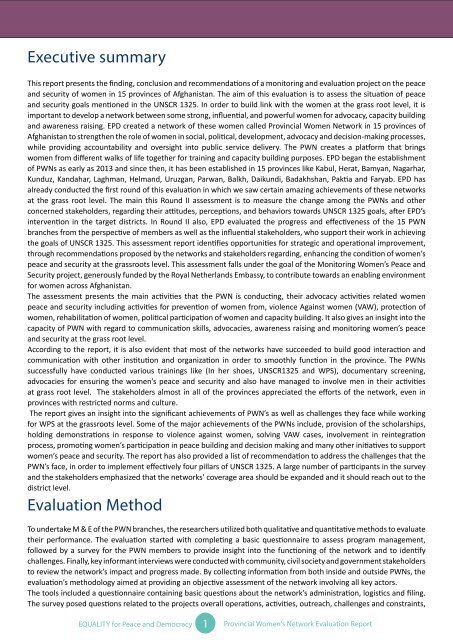Evaluation Report
4HMKrjjbt
4HMKrjjbt
Create successful ePaper yourself
Turn your PDF publications into a flip-book with our unique Google optimized e-Paper software.
Executive summary<br />
This report presents the finding, conclusion and recommendations of a monitoring and evaluation project on the peace<br />
and security of women in 15 provinces of Afghanistan. The aim of this evaluation is to assess the situation of peace<br />
and security goals mentioned in the UNSCR 1325. In order to build link with the women at the grass root level, it is<br />
important to develop a network between some strong, influential, and powerful women for advocacy, capacity building<br />
and awareness raising. EPD created a network of these women called Provincial Women Network in 15 provinces of<br />
Afghanistan to strengthen the role of women in social, political, development, advocacy and decision-making processes,<br />
while providing accountability and oversight into public service delivery. The PWN creates a platform that brings<br />
women from different walks of life together for training and capacity building purposes. EPD began the establishment<br />
of PWNs as early as 2013 and since then, it has been established in 15 provinces like Kabul, Herat, Bamyan, Nagarhar,<br />
Kunduz, Kandahar, Laghman, Helmand, Uruzgan, Parwan, Balkh, Daikundi, Badakhshan, Paktia and Faryab. EPD has<br />
already conducted the first round of this evaluation in which we saw certain amazing achievements of these networks<br />
at the grass root level. The main this Round II assessment is to measure the change among the PWNs and other<br />
concerned stakeholders, regarding their attitudes, perceptions, and behaviors towards UNSCR 1325 goals, after EPD’s<br />
intervention in the target districts. In Round II also, EPD evaluated the progress and effectiveness of the 15 PWN<br />
branches from the perspective of members as well as the influential stakeholders, who support their work in achieving<br />
the goals of UNSCR 1325. This assessment report identifies opportunities for strategic and operational improvement,<br />
through recommendations proposed by the networks and stakeholders regarding, enhancing the condition of women’s<br />
peace and security at the grassroots level. This assessment falls under the goal of the Monitoring Women’s Peace and<br />
Security project, generously funded by the Royal Netherlands Embassy, to contribute towards an enabling environment<br />
for women across Afghanistan.<br />
The assessment presents the main activities that the PWN is conducting, their advocacy activities related women<br />
peace and security including activities for prevention of women from, violence Against women (VAW), protection of<br />
women, rehabilitation of women, political participation of women and capacity building. It also gives an insight into the<br />
capacity of PWN with regard to communication skills, advocacies, awareness raising and monitoring women’s peace<br />
and security at the grass root level.<br />
According to the report, it is also evident that most of the networks have succeeded to build good interaction and<br />
communication with other institution and organization in order to smoothly function in the province. The PWNs<br />
successfully have conducted various trainings like (In her shoes, UNSCR1325 and WPS), documentary screening,<br />
advocacies for ensuring the women’s peace and security and also have managed to involve men in their activities<br />
at grass root level. The stakeholders almost in all of the provinces appreciated the efforts of the network, even in<br />
provinces with restricted norms and culture.<br />
The report gives an insight into the significant achievements of PWN’s as well as challenges they face while working<br />
for WPS at the grassroots level. Some of the major achievements of the PWNs include, provision of the scholarships,<br />
holding demonstrations in response to violence against women, solving VAW cases, involvement in reintegration<br />
process, promoting women’s participation in peace building and decision making and many other initiatives to support<br />
women’s peace and security. The report has also provided a list of recommendation to address the challenges that the<br />
PWN’s face, in order to implement effectively four pillars of UNSCR 1325. A large number of participants in the survey<br />
and the stakeholders emphasized that the networks’ coverage area should be expanded and it should reach out to the<br />
district level.<br />
<strong>Evaluation</strong> Method<br />
To undertake M & E of the PWN branches, the researchers utilized both qualitative and quantitative methods to evaluate<br />
their performance. The evaluation started with completing a basic questionnaire to assess program management,<br />
followed by a survey for the PWN members to provide insight into the functioning of the network and to identify<br />
challenges. Finally, key informant interviews were conducted with community, civil society and government stakeholders<br />
to review the network’s impact and progress made. By collecting information from both inside and outside PWNs, the<br />
evaluation’s methodology aimed at providing an objective assessment of the network involving all key actors.<br />
The tools included a questionnaire containing basic questions about the network’s administration, logistics and filing.<br />
The survey posed questions related to the projects overall operations, activities, outreach, challenges and constraints,<br />
EQUALITY for Peace and Democracy<br />
1<br />
Provincial Women's Network <strong>Evaluation</strong> <strong>Report</strong>


